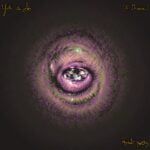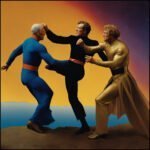Originally posted on my blog Sloth And Dignity.
A few years back, my friend Al Katkowski was something of a success with his "Question Of The Day" iphone app and subsequent book. This was a question from the book.
Question of the day: When was the first time you noticed someone cheating at something?
Actually, the first person I noticed cheating would be myself. I totally figured it out on my own before ever seeing anyone else do it. I think I got my first inkling when I was 4 and tried to tell my friend Stephen Axeman I was 4 1/2, not 4, because I thought it made me sound grownup. Somehow he knew I wasn't 4 1/2! So when I turned 4 1/2, I told him again, and he said, "Yes, today you are." I never found out how he knew exactly when my half-birthday was, but it was an epiphany that mysterious means existed by which I might be found out.
But really, my first experience with real cheating would be in second grade. I hadn't finished my homework, and my teacher, Mrs. Beekman, wrote a note in my notebook for my mom to sign. So what I did, on the bus home, I forged her signature. Of course, what I failed to consider, was that I was a second-grader and unwise in the ways of the world—I wasn't aware of my own ignorance. So I figured it was fine that instead of scribbling my mother's signature, I printed longhand, in widely spaced letters, "Mrs. Kupi"—and then I hit the edge of the page and ran out of room. But I wasn't going to let an obstacle like that stop me. I simply added a hyphen, and continued the name on the next line, so my "mom's signature" came out like this, printed:
M r s . K u p i-
e t z
Genius!
The next day, my teacher called me up in front of the whole class to show her my mom's signature on the note. I turned to the page nervously - I still recall this so clearly - and showed it to her. She got very quiet, and just looked at it for a moment.
After looking at it thoughtfully, she looked at me, and said, "Michael, is that really your mother's signature?"
I said, "Yes."
She looked at it again for another thoughtful moment. "Now Michael " - here she paused for emphasis - "your mother is in the next room. If I take this and show it to her, will she say it's her signature?"
But clearly Mrs. Beekman was underestimating me. Did she think I'd conquered the running-out-of-space-on-the-first-line crisis only to be undone now by a bluff, a transparent lie? Not a chance!
I said, "Yes."
Once again, genius! I was at the top of my seven-year-old game.
And Mrs. Beekman walked out of the room for a curious moment. Had I known at the time that this was the very last moment of my innocence, that immediately following it I would have the first adult experience of my life, I might have savored it. But I didn't. As it was, I just stood quietly in front of the class waiting to see what was about to happen. And a minute later, Mrs. Beekman walked back into the room. With my mom.
Mrs. Beekman held out the notebook, and theatrically said, "Mrs. Kupietz, is this your signature?"
And my mom said "no," and turned and walked back out of the room.
Several important life lessons were learned in that single seminal moment:
1.) Life is funny.
2.) You're not as smart as you think you are.
3.) The devil is in the details.
Needless to say, I got in some trouble over this incident, both with Mrs. Beekman AND at home that night. Years later, my mom, who was very active in the PTA, told me she had had just happened by coincidence to be in the next classroom that afternoon working on a PTA project, and that she and Mrs. Beekman had shared a very good laugh in the hallway. "It was really cute, " she said.
So, that was one more early lesson that I eventual took to heart:
4.) If you're going to make some sort of trouble, at least make it funny. The authorities are people, too.
I still heed those lessons to this day, especially the last one.






